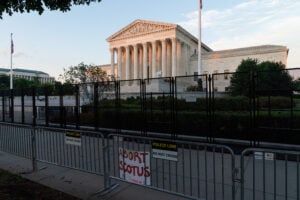(Photo
by
Eric
Lee/Bloomberg
via
Getty
Images}
Why
do
we
care
about
what
the
Nine
Robed
Figures
have
to
say?
There
are
the
routine
answers:
Marbury,
Plessy,
Roe,
Dobbs,
Bruen, Gideon,
Bakke,
etc.
But
to
answer
in
this
way
already
misses
the
point.
One
could
go
on
and
analyze
the
merits
of
the
decisions
to
undercut
the
authority
of
the
decisions
handed
down
—
Marbury
could
have
easily
been
resolved
differently
if
the
judges
ordered
a
dude
to
deliver
some
mail,
after
all.
What
grants
their
opinions
the
power
of
judgment
as
such?
As
it
turns
out,
it
doesn’t
have
much
to
do
with
them.
It
has
to
do
with
us.
[W]hen
the
Supreme
Court
itself
has
discussed
legitimacy,
the
case
in
which
the
Court
gave
its
longest
discussion
of
the
term
legitimacy
before
Dobbs was Planned
Parenthood
v.
Casey…three
Republican
appointees,
Anthony
Kennedy,
David
Souter,
and
Sandra
Day
O’Connor,
authored
this
joint
opinion
in
which
they
asked
the
question,
why
do
people
listen
to
the
Supreme
Court?
Why
don’t
they
just
treat
our
opinions
as
no
different
from
a
press
release
by
a
conservative
senator,
or
a
liberal
senator?
Why
do
they
take
our
opinions
and
do
things
with
it?And
their
answer
to
that
question
was
legitimacy.
They
defined
the
term
legitimacy
as
basically,
the
general
understanding
among
the
American
public,
that
when
the
Court
issues
an
opinion,
what
it
is
doing
is
engaging
in
this
principled
analysis,
as
opposed
to
just
exercising
the
individual
views
of
the
justices.
This
reading,
assuming
that
what
grants
the
Supreme
Court
its
authority
is
more
than
a
line
or
two
in
the
Constitution
and
includes
the
people’s
belief
that
judges
are
doing
their
jobs
in
a
principled
manner
may
explain
why
the
justices
have
expended
so
much
hot
air
extolling
their
neutrality
—
despite
clear
evidence
otherwise.
[T]oday’s
Court
had
a
choice
of,
do
we
want
to
cultivate
this
public
perception
that
what
we
are
doing
is
different
from,
say,
what
five
Ted
Cruzes
would
do
if
he
were
on
the
Court?
Or,
you
know,
you
can
get
a
Supreme
Court
of
former
clerks
that
are
currently
in
Congress,
like
Josh
Hawley
or
Ted
Cruz,
and
then
like
Mitch
McConnell,
you
take
five
of
them,
give
them
robes
and
a
gavel
—
is
what
we’re
doing
different
from
what
they
would
do?And
to
the
extent
that
the
public
believed
there
is
this
distinction
between
the
two,
then
yes,
I
think
that
today’s
Court
basically
does
not
care
about
that
distinction.
In
the Dobbs opinion,
Justice
Alito
explicitly
said,
it’s
not
our
job
to
care
about
public
opinion.
We
shouldn’t
take
that
into
consideration
at
all.But
I
think
what
the
Court
is
realizing,
especially
in
the
last
few
weeks,
is,
if
you
do
not
care
about
public
opinion,
and
you
do
something
that’s
extremely
controversial,
you
risk
the
public
turning
on
you.
And
eventually
at
some
point,
if
you
anger
enough
people,
the
public
will
stop
listening
and
start
doing
something
to
reform
your
power.
I
think
two
big
points
stem
from
this.
The
first
is
that
I
doubt
it’s
a
coincidence
that
the
Court’s
handwaving
of
legitimacy
coincides
with
historically
low
approval
ratings.
And
while
talk
of
term
limits
and
codes
of
conduct
have
long
been
a
point
of
concern
about
regulating
the
behavior
of
Supreme
Court
justices,
the
uptick
in
these
conversations
could
be
explained
by
a
widespread
feeling
of
there
being
a
counter-majoritarian
problem
that
rises
in
relation
to
legitimacy’s
decline.
The
second
related
point
is
that
a
Court
that
not
only
operates
without
legitimacy,
but
wantonly
so
re:
Alito,
is
very
hard
if
not
impossible
to
distinguish
from
a
vigilante
or
rogue
court.
If
they
don’t
care
about
public
opinion,
what
keeps
them
in
check?
It’s
not
like
they
have
a
code
of
conduct
they
have
to
follow
or
anything.
Prof.
Bowie
thinks
that
if
we
want
to
live
in
a
democratic
nation,
rather
than
a
state
whose
laws
are
dictated
by
a
Rogue
9
with
no
real
check
against
their
authority,
we
ought
to
vest
more
legitimacy
in
a
different
branch.
Which
institutions
should
be
responsible
for
resolving
these
fundamental
disagreements?…[W]hat
do
other
countries
do?
In
most
other
democratic
societies,
national
legislatures
are
responsible
for
making
these
determinations,
particularly
democratically
responsive
national
legislatures.
From
the
United
Kingdom
to
France
and
Germany
and
New
Zealand
—
in
general,
these
sorts
of
questions
are
decided
by
national
legislation.
And
national
legislation
enacted
through
far
more
democratic
legislatures
than
the
United
States
Congress.So
I
would
love
to
see
a
more
democratic
Congress.
I
would
love
to
see
reforms
to
Congress
to
make
it
more
democratic.But
even
the
Congress
we
have
now,
I
think,
is
a
better
answer
to
the
question
of
who
should
resolve
these
questions
than
another
institution
like
state
legislatures,
or
local
governments,
or
neighborhood
associations,
or
federal
or
state
courts.
It
is
a
bold
solution
given
how
often
politicking
gets
in
the
way
of
common
sense
—
KBJ’s
confirmation
was
far
more
dramatic
than
it
needed
to
be.
But
I
think
that
something
has
to
happen.
And
it
has
to
happen
now.
Democracy
has
been
declining
globally
and
will
likely
continue
down
the
slope
if
barriers
are
not
erected
to
protect
it.
How
To
Save
Democracy
From
The
Supreme
Court
[VOX]
 Chris
Chris
Williams
became
a
social
media
manager
and
assistant
editor
for
Above
the
Law
in
June
2021.
Prior
to
joining
the
staff,
he
moonlighted
as
a
minor
Memelord™
in
the
Facebook
group Law
School
Memes
for
Edgy
T14s.
He
endured
Missouri
long
enough
to
graduate
from
Washington
University
in
St.
Louis
School
of
Law.
He
is
a
former
boatbuilder
who
cannot
swim, a
published
author
on
critical
race
theory,
philosophy,
and
humor,
and
has
a
love
for
cycling
that
occasionally
annoys
his
peers.
You
can
reach
him
by
email
at cwilliams@abovethelaw.com and
by
tweet
at @WritesForRent.

